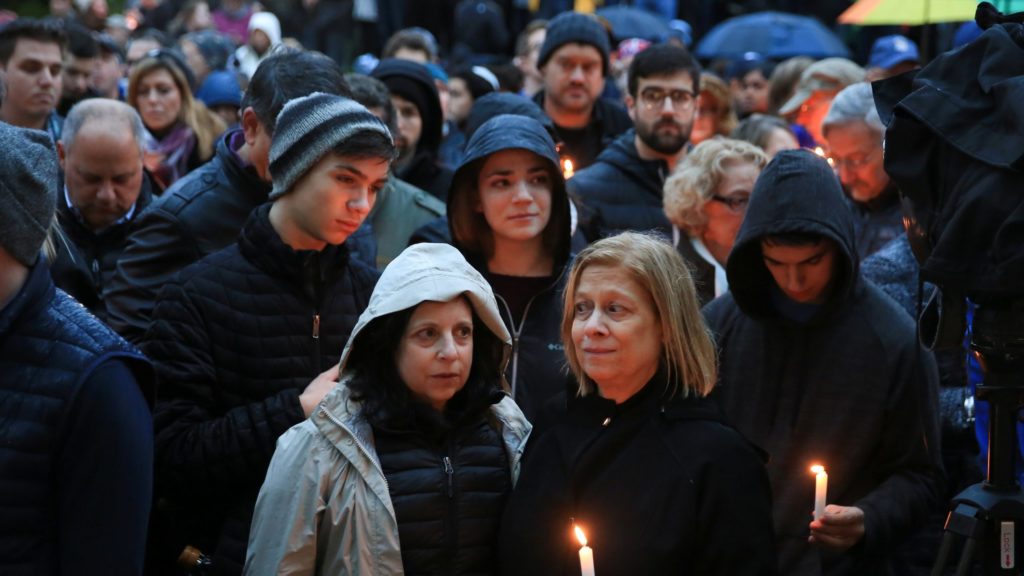The conviction of a mass shooter who murdered 11 people and wounded six more at a Pittsburgh synagogue during services "sends a clear message" against antisemitism, while challenging Catholics to ensure such attacks never happen again, experts in Jewish-Catholic relations told OSV News.
On June 16, a federal jury found 50-year-old Robert Bowers of Baldwin, Pennsylvania, guilty of all 63 charges filed against him in the Oct. 27, 2018, assault on worshippers at the Tree of Life Congregation in Pittsburgh's Squirrel Hill neighborhood, home to a number of Jewish faith communities and businesses.
Bowers, dressed in tactical gear and wielding an AR-15 rifle and three Glock .357 handguns, stormed into the building, which housed worshippers from three Jewish congregations, and fired upon his victims at close range, according to prosecutors. Those slain ranged in age from 54 to 97, and included two brothers with disabilities, David and Cecil Rosenthal. Bowers also fired upon responding officers, injuring several.
The attack, conducted with legally purchased weapons, is the deadliest ever upon Jewish people in the U.S., said the Anti-Defamation League, which hailed the verdict in a June 16 statement.
Ahead of the crime, Bowers -- who up to then had no existing criminal record -- posted on the alternative social media platform Gab.com several antisemitic threats and slurs, saying he believed "Jews are the children of satan."
Bowers repeatedly accused the Hebrew Immigrant Aid Society (HIAS) of "(bringing) invaders in that kill our people," uploading one such message just before entering the synagogue.
Sentencing deliberations for Bowers begin June 26, with the same jury set to decide if he will face the death penalty or life in prison without parole.
The trial verdict itself was both a just and "appropriate outcome," said Adam Gregerman, professor of theology and co-director of the Institute for Jewish-Catholic Relations at St. Joseph University's Institute for Jewish-Catholic Relations (IJCR) in Philadelphia.
"It is important for American jurisprudence and society that such a murderous assault on a house of prayer be punished," agreed Philip Cunningham, professor of theology at St. Joseph's University and IJCR co-director. "The fact that this attack occurred in a synagogue on Sabbath unavoidably indicates antisemitism ... and additionally because it was a Jewish relief agency that enraged (Bowers)."
The massacre "serves as a reminder that antisemitic violence is not a matter of the past but is unfortunately still prevalent today," said John Cappucci, principal and vice chancellor of Assumption University in Windsor, Ontario, where he holds the Stephen Jarislowsky Chair in Religion and Conflict. "It also shows that sacred spaces are no longer sanctuaries where people can expect a degree of safety and security. Instead, they can be a site of violence."
Cappucci noted his school is working to counter antisemitism by expanding courses in Jewish-Christian relations and Holocaust studies, thanks to a recent $30,000 gift from philanthropist and academic Daniel Andreae.
Along with justice and education, faith and outreach are essential in helping to heal the scars from the attack, said Pittsburgh Bishop David A. Zubik.
In a June 16 statement, Bishop Zubik quoted from Deuteronomy 7, in which Moses tells the Jewish people "the Lord has set his heart on you because the Lord loved you."
"At this delicate time for the Pittsburgh Jewish community and beyond, we all need to embrace not only God’s words but especially at this time set our hearts on our Jewish sisters and brothers as God does," he said.
With the verdict against Bowers "(sending) a clear message that our society rejects acts of terror and violence against religious communities," Catholics must "reach out in support of their Jewish counterparts and neighbors, not only in Pittsburgh, but across the country," said Arthur Urbano, professor of theology and chair of the Jewish-Catholic Theological Exchange Committee at Providence College in Providence, Rhode Island.
That mission includes actively confronting antisemitism, said Matthew Tapie, associate professor of theology and director of the Center for Catholic-Jewish Studies at St. Leo University in St. Leo, Florida.
"Catholics, especially our leaders, must not remain silent in the face of attacks on our Jewish neighbors, or other religious minorities, or houses of worship," he said. "Catholic leaders have a responsibility to condemn anti-immigrant language and antisemitic language especially if this is uttered by politicians. Today, such attitudes and language can spread racist sentiment like wildfire, especially on the internet."
He encouraged bishops to reprint and distribute a Nov. 28, 2022, statement from the U.S. Bishops’ Committee on Ecumenical and Interreligious Affairs, emphasizing the church's recommitment to relations with the Jewish community and affirming the Second Vatican Council's call to decry all "hatred, persecutions, displays of antisemitism directed against Jews at any time and by anyone" ("Nostra Aetate," 4).

